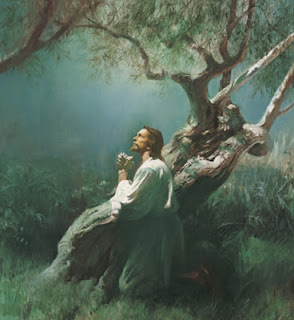One of the great teachings of Mormonism is that of repentance. Through repentance a person may be cleansed through the Atonement of Jesus Christ. Previously I have shared a page about Christ's healing power with the Legion. Now I'd like to share another scripture story of his healing power, that of Naaman the Syrian captain.
Although these two stories - Naaman and Legion - are physical healing, they equally show what the Lord can do for us through repentance. First I will share the story, and then add my thoughts on the repentance side of it.
2 Kings 5
1. Now Naaman, captain of the host of the king of Syria, was a great man with his master, and honourable, because by him the LORD had given deliverance unto Syria: he was also a mighty man in valour, but he was a leper.
2. And the Syrians had gone out by companies, and had brought away captive out of the land of Israel a little maid; and she waited on Naaman's wife.
3. And she said unto her mistress, Would God my lord were with the prophet that is in Samaria! for he would recover him of his leprosy.
4. And one went in, and told his lord, saying, Thus and thus said the maid that is of the land of Israel.
5. And the king of Syria said, Go to, go, and I will send a letter unto the king of Israel. And he departed, and took with him ten talents of silver, and six thousand pieces of gold, and ten changes of raiment.
6. And he brought the letter to the king of Israel, saying, Now when this letter is come unto thee, behold, I have therewith sent Naaman my servant to thee, that thou mayest recover him of his leprosy.
7. And it came to pass, when the king of Israel had read the letter, that he rent his clothes, and said, Am I God, to kill and to make alive, that this man doth send unto me to recover a man of his leprosy? wherefore consider, I pray you, and see how he seeketh a quarrel against me.
8. And it was so, when Elisha the man of God had heard that the king of Israel rent his clothes, that he sent to the king, saying, Wherefore hast thou rent thy clothes? let him come now to me, and he shall know that there is a prophet in Israel.
9. So Naaman came with his horses and with his chariot, and stood at the door of the house of Elisha.
10. And Elisha sent a messenger unto him, saying, Go and wash in Jordan seven times, and thy flesh shall come again to thee, and thou shalt be clean.
11. But Naaman was wroth, and went away, and said, Behold, I thought, He will surely come out to me, and stand, and call on the name of the LORD his God, and strike his hand over the place, and recover the leper.
12. Are not Abana and Pharpar, rivers of Damascus, better than all the waters of Israel? may I not wash in them, and be clean? So he turned and went away in a rage.
13. And his servants came near, and spake unto him and said, My father, if the prophet had bid thee do some great thing, wouldest thou not have done it? how much rather then, when he saith to thee, Wash, and be clean?
14. Then went he down, and dipped himself seven times in Jordan, according to the saying of the man of God: and his flesh came again like unto the flesh of a little child, and he was clean.
Naaman had leprosy, which was one of the most feared diseases at this time. Moses' law taught that if a man had leprosy he was to live alone outside of the city (see Leviticus 13:45-46). To make matters more humiliating for Naaman, Elisha told him not to wash in the clean Abana or Pharpar rivers, but to wash in the filthy Jordan.
Like that of Legion, this must have seemed like a worst-case scenario for Naaman. He was unclean and was told to wash in an unclean river. But, with the encouragement of his servants, he did wash in Jordan and was cleaned of his unclean disease.
I believe this to be a testament that Christ is the master-healer. No one can become too unclean through sin to be healed by the Atonement. The process of repentance is real and the cleansing through Christ is real. Like Naaman and Legion being clean with physical problems, we can be clean of sinful problems through Jesus Christ.
If you have further questions about repentance you can read more about it here:
Or you can ask a Mormon missionary here:













